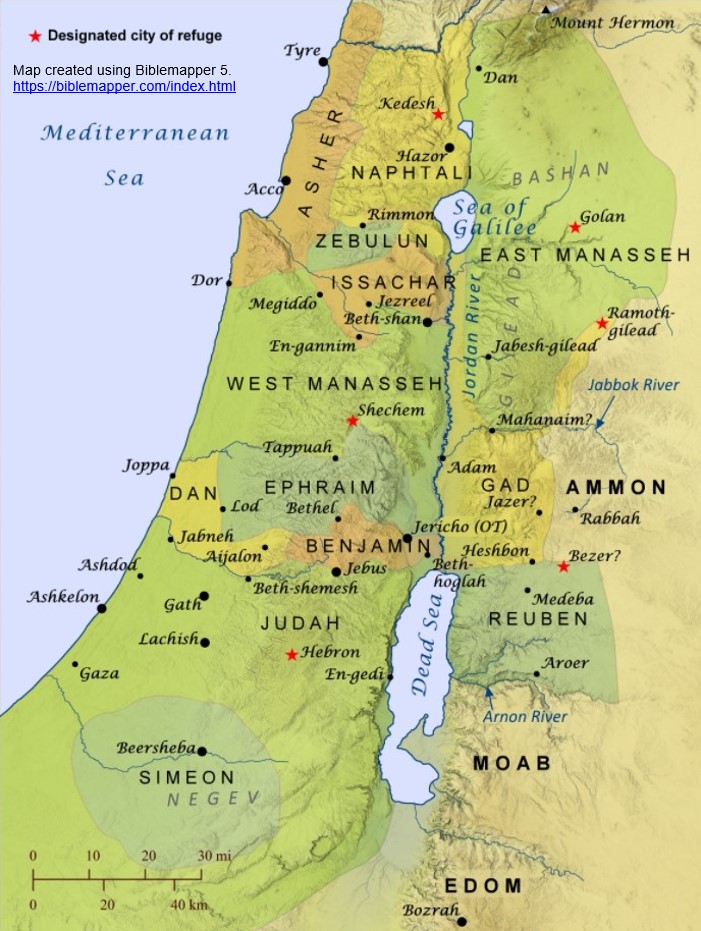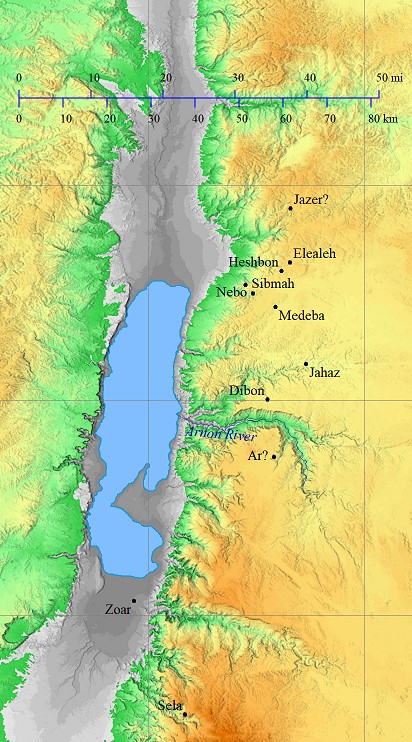Chapter 15

The Moabites had occupied territory on the east side of the River Jordan, roughly opposite to Jerusalem. Moab was a son of Lot (Genesis 19:37-38), so they were related to the Israelites. Together with he Ammonites (from Lot’s other son) they had been opposed to Israel – and Israel’s God.
After the Exodus, when the land was allocated to the Israelites, this area was given to Reuben and Gad (Numbers 32:1-5, 33-38), but the Moabites eventually re-took it.
Some of the towns and cities mentioned have been identified, but when reading the passage, I think it’s probably best to just build a picture of the events rather than try to work out where they were.
Chapter15

1 A prophecy against Moab:
Ar in Moab is ruined, destroyed in a night!
Kir in Moab is ruined, destroyed in a night!
2 Dibon goes up to its temple, to its high places to weep; Moab wails over Nebo and Medeba.
Every head is shaved and every beard cut off.
3 In the streets they wear sackcloth; on the roofs and in the public squares they all wail, prostrate with weeping.
4 Heshbon and Elealeh cry out, their voices are heard all the way to Jahaz.
Therefore the armed men of Moab cry out, and their hearts are faint.
As I write this there is continuing conflict in Gaza, with many homes destroyed and people fleeing with whatever belongings they can carry. It is distressing to watch, and for Isaiah too, as he prophesied the terrible destruction here, he also found it distressing.
5 My heart cries out over Moab; her fugitives flee as far as Zoar, as far as Eglath Shelishiyah.
They go up the hill to Luhith, weeping as they go; on the road to Horonaim they lament their destruction.
The waters of Nimrim are dried up and the grass is withered; the vegetation is gone and nothing green is left.
7 So the wealth they have acquired and stored up they carry away over the Ravine of the Poplars.
8 Their outcry echoes along the border of Moab; their wailing reaches as far as Eglaim, their lamentation as far as Beer Elim.
9 The waters of Dimon are full of blood, but I will bring still more upon Dimon – a lion upon the fugitives of Moab and upon those who remain in the land.
I said it was distressing for Isaiah, but comparing verse 5 ‘My heart cries out over Moab’ with verse 9 ‘but I will bring still more upon Dimon’ it becomes obvious that God himself is the one who is saddened. I have just read a book that tries to reconcile the God of violence in the Old Testament with the God of love in the New, but like many before her, the author struggles.
The problem goes all the way back to the Garden of Eden when Adam and Eve effectively said to God: ‘I don’t want to do what you want me to do – I want to do what I want to do’. Once sin had defiled God’s perfect creation, suffering and devastation was never far away.
God tried to shape his chosen people into a Holy people, but they would have none of it. Many times God set before them choices – blessings for obedience, but punishment if they refused. They took the blessings but still turned their back on God. So God stepped back allowing man to suffer from ‘the World, the Flesh and the Devil’ – the three most powerful forces that still plague mankind today.
But when they honestly cried to him for help, God would again intervene – here using one pagan nation to fight against another. But all the while the God of love is saddened by what he sees until finally he is prepared to offer the ultimate solution – the death and resurrection of his only beloved son who alone could atone for the sins of the world, and through his Spirit enter the hearts and lives of individuals.
Chapter 16
1 Send lambs as tribute to the ruler of the land, from Sela, across the desert, to the mount of Daughter Zion.
For those who will repent, and seek forgiveness – here suggested by offerings to Jerusalem – there will come respite.
2 Like fluttering birds pushed from the nest, so are the women of Moab at the fords of the Arnon.
3 ‘Make up your mind,’ Moab says. ‘Render a decision.
Make your shadow like night – at high noon.
Hide the fugitives, do not betray the refugees.
4 Let the Moabite fugitives stay with you; be their shelter from the destroyer.’
Difficult to understand, but it feels like the start of chapter 32:
1 See, a king will reign in righteousness
and rulers will rule with justice.
2 Each one will be like a shelter from the wind
and a refuge from the storm,
like streams of water in the desert
and the shadow of a great rock in a thirsty land.
Now read the second part of verse 4, and 5
The oppressor will come to an end, and destruction will cease; the aggressor will vanish from the land.
5 In love a throne will be established; in faithfulness a man will sit on it – one from the house of David – one who in judging seeks justice and speeds the cause of righteousness
Here again, we look forward to the coming Redeemer – bringing love, justice and Righteousness.
Now, as we read the conclusion of the prophecy concerning Moab, remember it is the Lord speaking (underlined), and showing how he shares their distress.
6 We have heard of Moab’s pride – how great is her arrogance! – of her conceit, her pride and her insolence; but her boasts are empty.
7 Therefore the Moabites wail, they wail together for Moab.
Lament and grieve for the raisin cakes of Kir Hareseth.
8 The fields of Heshbon wither, the vines of Sibmah also.
The rulers of the nations have trampled down the choicest vines, which once reached Jazer and spread towards the desert.
Their shoots spread out and went as far as the sea.
9 So I weep, as Jazer weeps, for the vines of Sibmah.
Heshbon and Elealeh, I drench you with tears!
The shouts of joy over your ripened fruit and over your harvests have been stilled.
10 Joy and gladness are taken away from the orchards; no one sings or shouts in the vineyards;
no one treads out wine at the presses, for I have put an end to the shouting.
11 My heart laments for Moab like a harp, my inmost being for Kir Hareseth.
12 When Moab appears at her high place, she only wears herself out;
when she goes to her shrine to pray, it is to no avail.
13 This is the word the Lord has already spoken concerning Moab. 14 But now the Lord says: ‘Within three years, as a servant bound by contract would count them, Moab’s splendour and all her many people will be despised, and her survivors will be very few and feeble.’
Look again at verse 6 ‘arrogance . . . conceit . . . pride . . . insolence’. Here demonstrated as they insist on praying to their own gods (verse 12) but ‘to no avail’.
Now as these distressing prophecies continue, Israel will be reminded that they are no better, and they too will suffer the results of their sinful rebellion.
Chapter 17
1 A prophecy against Damascus:
‘See, Damascus will no longer be a city but will become a heap of ruins.
2 The cities of Aroer will be deserted and left to flocks, which will lie down, with no one to make them afraid.
3 The fortified city will disappear from Ephraim, and royal power from Damascus;
the remnant of Aram will be like the glory of the Israelites,’
declares the Lord Almighty.
The mention of Ephraim and Damascus together may relate to the fact that Rezin, king of Israel (in the north) had formed an allegiance with the Arameans (Damascus) to fight against Judah in the south.
Verse 1 has the title 'A prophecy against Damascus' but this prophecy soon includes Israel too.
4 ‘In that day the glory of Jacob will fade; the fat of his body will waste away.
5 It will be as when reapers harvest the standing corn, gathering the corn in their arms – as when someone gleans ears of corn in the Valley of Rephaim.
Those who believed they were strong would fall like corn being reaped, and the gleaners would come to pick over the remains.
6 Yet some gleanings will remain, as when an olive tree is beaten, leaving two or three olives on the topmost branches, four or five on the fruitful boughs,’
declares the Lord, the God of Israel.
7 In that day people will look to their Maker and turn their eyes to the Holy One of Israel.
8 They will not look to the altars, the work of their hands, and they will have no regard for the Asherah poles and the incense altars their fingers have made.
9 In that day their strong cities, which they left because of the Israelites, will be like places abandoned to thickets and undergrowth. And all will be desolation.
Always the Lord makes sure there will still be some who escape, but they will have to acknowledge that it was the Lord who saved them. The altars and images of their false gods will be ignored as they come to their senses. But the land will still be desolate.
10 You have forgotten God your Saviour; you have not remembered the Rock, your fortress.
Therefore, though you set out the finest plants and plant imported vines, 11 though on the day you set them out, you make them grow, and on the morning when you plant them, you bring them to bud, yet the harvest will be as nothing in the day of disease and incurable pain.
Many times they had been warned that although in their pride they would work hard to maximise their crops, it is the Lord who can make a harvest succeed or fail. So now, because they had deliberately turned their back on God, their Saviour, their Rock, their Fortress – the time had come for him to act.
12 Woe to the many nations that rage – they rage like the raging sea!
Woe to the peoples who roar – they roar like the roaring of great waters!
13 Although the peoples roar like the roar of surging waters, when he rebukes them they flee far away, driven before the wind like chaff on the hills, like tumble-weed before a gale.
14 In the evening, sudden terror! Before the morning, they are gone!
This is the portion of those who loot us, the lot of those who plunder us.
I picture a child, looking for the first time at a massive wave roaring up a beach towards him, and turning and running in fright; only to discover the same wave retreating like some wounded animal. Many nations will attack God’s chosen people but ‘when he rebukes them they flee far away’.
Chapter 18
A prophecy against Cush
Where is Cush?
Not Egypt, but further up the Nile, south into Nubia – into Sudan but not as far as modern Ethiopia. The population generally was centred on the headwaters of the Nile, as the encroaching Sahara desert made life difficult in the rest of the region. (The Sahara has long been a breeding ground of the Desert Locust.) Kings from Cush actually ruled Egypt during the 8th century BC – when Isaiah was prophesying.

1 Woe to the land of whirring wings along the rivers of Cush,
2 which sends envoys by sea in papyrus boats over the water.
Go, swift messengers, to a people tall and smooth-skinned,
to a people feared far and wide, an aggressive nation of strange speech,
whose land is divided by rivers.
Many of the nations around Israel spoke similar semitic languages – rather like dialects – but these beardless people spoke a totally different language which seemed startlingly strange.
3 All you people of the world, you who live on the earth,
when a banner is raised on the mountains, you will see it,
and when a trumpet sounds, you will hear it.
4 This is what the Lord says to me:
‘I will remain quiet and will look on from my dwelling-place, like shimmering heat in the sunshine, like a cloud of dew in the heat of harvest.’
5 For, before the harvest, when the blossom is gone and the flower becomes a ripening grape, he will cut off the shoots with pruning knives, and cut down and take away the spreading branches.
6 They will all be left to the mountain birds of prey and to the wild animals;
the birds will feed on them all summer, the wild animals all winter.
It seemed that the Lord had overlooked these people and they had been allowed to live in prosperity, but a time was set when he will act.
7 At that time gifts will be brought to the Lord Almighty from a people tall and smooth-skinned, from a people feared far and wide, an aggressive nation of strange speech, whose land is divided by rivers – the gifts will be brought to Mount Zion, the place of the Name of the Lord Almighty.
The Lord would also use Esarhaddon from Assyria to attack Cush as the means of their punishment, but when Assyria had been defeated by the Babylonians the people would recognise the Lord’s hand in this and would bring grateful gifts.





